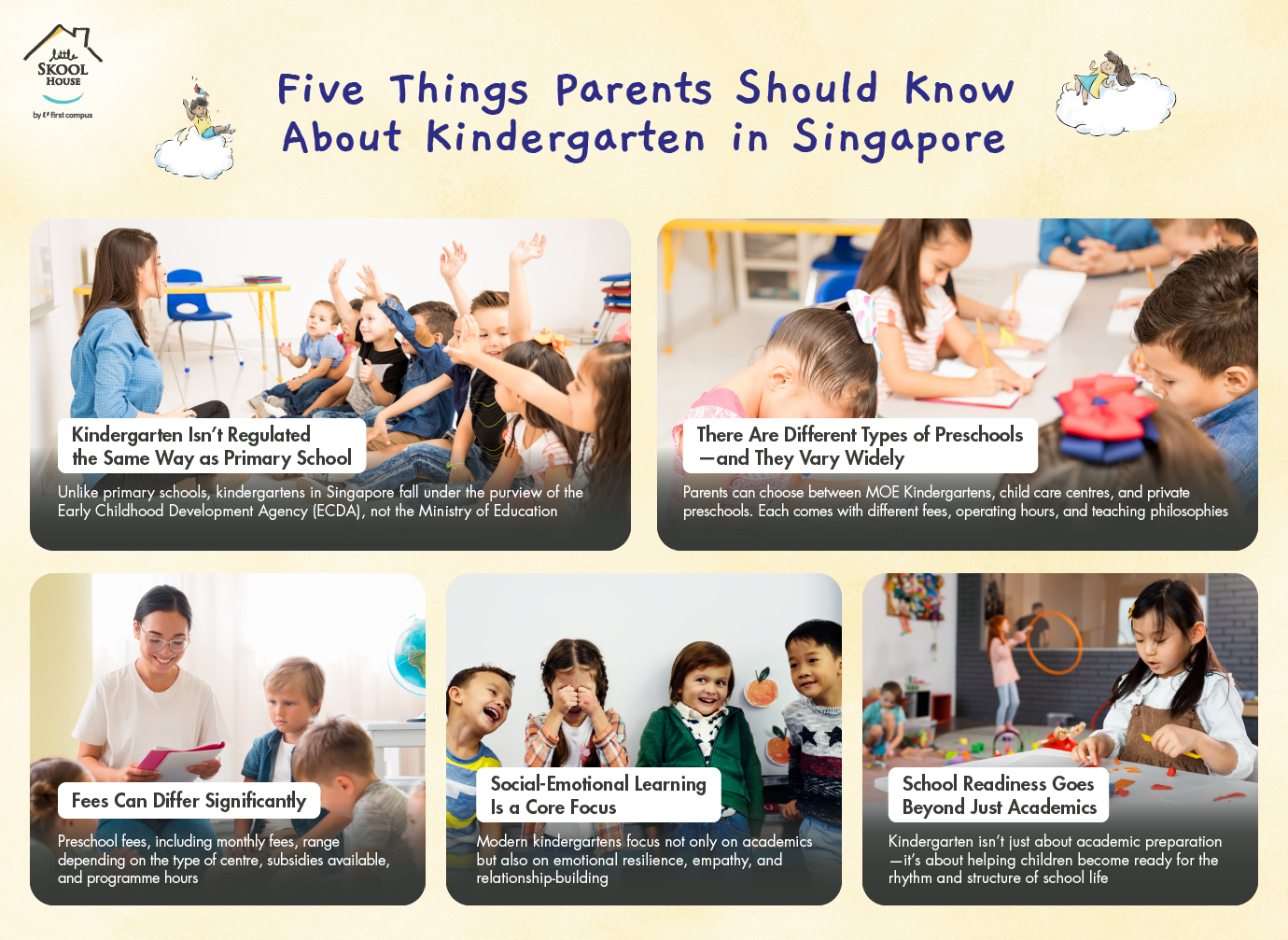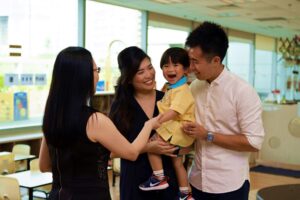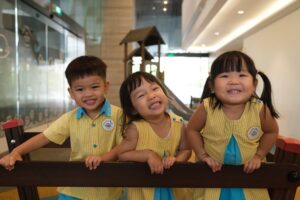BACK
For many parents in Singapore, the early years of a child’s life are filled with big questions, and few feel as weighty as: Should I send my child to kindergarten? Legally, the answer might surprise you.
No, kindergarten isn’t compulsory in Singapore.
But before you breathe a sigh of relief (or uncertainty), it’s worth understanding why the vast majority of parents still choose to enrol their children in preschool—and what a well-designed kindergarten experience can do for your child’s growth.
In premium preschool settings like Little Skool House, these formative years aren’t just about preparing for Primary 1—they’re about nurturing curiosity, communication, and confidence from the very beginning.
Is Kindergarten Compulsory in Singapore?
The Legal Status of Kindergarten in Singapore
In Singapore, kindergarten is not mandatory. According to the Ministry of Education (MOE), only Primary 1 education, starting at age 7, falls under the Compulsory Education Act.1
That means attending preschool—whether it’s nursery, K1 or K2—is entirely up to the parents. Still, the vast majority choose to enrol their children well before formal education begins, with 95% of Singaporean children aged 5-6 enrolled in a preschool.2
Government subsidies, such as the Kindergarten Fee Assistance Scheme (KIFAS), also play a crucial role in making quality preschool education accessible to low-income families and Singapore citizens, enabling affordable enrollment in government-supported preschools.
This widespread practice reflects more than just societal norms. In nurturing preschool environments, early education provides children with a rich foundation to grow emotionally, socially, and intellectually.
Why Most Parents Still Choose to Enrol Their Child
While kindergarten may not be a legal requirement, it often becomes a practical and emotional one. Parents recognise that early learning experiences help their children adapt more smoothly to the structured environment of primary school.
They also want their little ones to develop language skills, social confidence, communication skills, and a sense of independence in a safe, guided setting.
Hands-on activities play a crucial role in early education, contributing to the overall development of young children.
Premium preschools in Singapore like Little Skool House go even further, helping children not just adjust, but thrive. Through our intentional routines and child-led learning, we create classrooms where young minds flourish.
What Does Kindergarten Look Like in Singapore Today?
Kindergarten in Singapore has evolved far beyond rote learning and simple ABCs. Today’s early childhood classrooms are dynamic environments where play meets purpose, and exploration is woven into every part of the day.
- A Balanced Daily Routine. Children thrive on a predictable rhythm of learning, play, and rest. Activities like art, music, and group games support structure and emotional security.
- Learning Through Play and Exploration. Kindergartens use play as a powerful tool for inquiry and discovery. Whether it’s counting with blocks or solving problems through role-play, learning is hands-on and meaningful.
- Bilingual Exposure and Cultural Awareness. Children are immersed in both English and their Mother Tongue through songs, stories, and daily conversation, fostering language skills and cultural identity.
- Nurturing Environments and Qualified Educators. Safe, engaging classrooms and professionally trained educators ensure that each child’s curiosity is supported in a responsive and caring way.
Five Things Parents Should Know About Kindergarten in Singapore

Now that we understand how kindergarten fits into Singapore’s educational framework, let’s take a closer look at what parents should be aware of when navigating their preschool options.
Kindergarten in Singapore is more than just a stepping stone to primary school. Here are five key things every parent should know before making this important decision:
1. Kindergarten Isn’t Regulated the Same Way as Primary School
Unlike primary schools, kindergartens in Singapore fall under the purview of the Early Childhood Development Agency (ECDA), not the Ministry of Education. This means preschools vary in curriculum, teacher qualifications, and learning approach.
It’s crucial to choose a centre that aligns with your values and expectations. Little Skool House, for instance, is ECDA-registered and exceeds baseline standards, offering a research-backed curriculum tailored to holistic development.
2. There Are Different Types of Preschools—and They Vary Widely
Parents can choose between MOE Kindergartens, child care centres, and private preschools. Each comes with different fees, operating hours, and teaching philosophies. Some are academically inclined, while others place equal emphasis on language, character, and cognitive growth through guided discovery.
The main difference between care centres and kindergartens lies in the duration of the programmes they offer, with care centres typically providing full-day options and kindergartens offering half-day programmes.
3. Fees Can Differ Significantly
Preschool fees, including monthly fees, range depending on the type of centre, subsidies available, and programme hours. While affordability is a concern for many, some parents are willing to invest more in premium early education, especially when it supports bilingualism, emotional development, and strong school readiness.
4. Social-Emotional Learning Is a Core Focus
Modern kindergartens focus not only on academics but also on emotional resilience, empathy, and relationship-building. These skills are essential for a child’s long-term success and well-being. Activities like group storytelling, collaborative play, and role-play all help develop emotional literacy.
Ensuring regular attendance is crucial in preschool education as it allows children, especially from lower-income families, to consistently participate and benefit from these programs. Government efforts to remove barriers to access are vital in promoting reliable attendance.
Centres like Little Skool House incorporate social-emotional learning seamlessly into daily routines and classroom experiences, helping children become compassionate, confident individuals.
5. School Readiness Goes Beyond ABCs and 123s
Kindergarten isn’t just about academic preparation—it’s about helping children become ready for the rhythm and structure of school life. This includes listening skills, turn-taking, concentration, and following instructions—all cultivated through thoughtful practice and consistency.
Given the rigorous nature of education in Singapore, Little Skool House takes pride in preparing children not only for primary school education but for life, with a preschool curriculum that supports cognitive, physical, and emotional readiness at every stage.
Kindergarten Isn’t Required—But a Strong Start Is
Although kindergarten is not compulsory in Singapore, it offers an exceptional opportunity for growth and development in a child’s early years. Given all these benefits, the next question becomes: where should your child begin their journey in a government-supported preschool?
At Little Skool House, the emphasis is on creating a nurturing, engaging environment where children not only learn academic skills but also develop social and emotional skills.
With a holistic curriculum, highly trained educators, and a child-centred approach, we ensure each child is fully prepared to thrive as they transition to primary school and beyond.
Choose from 20 Conveniently-Located Centres
Source
- https://www.moe.gov.sg/primary/compulsory-education/overview
- https://www.moe.gov.sg/news/parliamentary-replies/20240909-kindergarten-education



